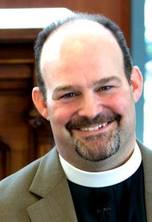|
As a parish priest, I am generally wary of responding overtly to the machinations of politicians and political candidates, knowing that within most faith communities, including my own congregation, people of good will hold a variety of political opinions. I believe that clergy should generally avoid wading into the waters of partisan politics, so as to avoid alienating members of their communities. However, there are those times when things are done or said in the political realm that go beyond partisanship and compel faith leaders to respond. Donald Trump's recent reactionary proposal that all Muslims be banned from entering the United States is one of those things.
I will preface my comments with the assurance that I have no intention of telling anyone for whom they should or should not vote. That is not my place. Rather, I am responding to an ideology that I believe runs completely counter to our mission as followers of Christ, and indeed runs counter to the core beliefs and values of all three Abrahamic faiths as I understand them. The suggestion that all Muslims should be banned from entering the United States stands in complete contrast to the Judaeo-Christian (and I would argue Muslim) call to hospitality, especially to those who are considered "strangers". Jesus' message lines up completely with that of the Old Testament prophets, who repeatedly urged the welcoming of the "stranger". During his public ministry, Jesus very intentionally reached out to and welcomed those whom others tended to fear and ostracize. In the ancient near-eastern world in which Jesus lived there was a strong fear-based culture that treated those who were different or "abnormal" as threats. There existed a black-and-white dualism that led to the demonization of whole classes and groups of people. Jesus was very clear in his rejection of this worldview, calling his followers away from fear and hatred to a place of faith and love. Fear, of course, is a natural human response when confronted with atrocities like the recent terrorist attacks in Paris and San Bernardino. We cannot help but be fearful of such horrific and violent acts. And we should certainly find ways to counter and prevent such things from happening, and pursue justice when they do. Jesus knew, however, that when we allow fear of the other to take root and become the primary motivation for our actions and how we live our lives, we become increasingly vulnerable to the power of evil. This dynamic has been painfully evident at various times in the history of humankind, with devastating consequences. Jesus offered the ultimate antidote to the poisons of fear and hatred: self-giving love. Donald Trump's proposal with regards to Muslims, whether or not he is motivated by fear himself, certainly encourages the kind of fear-based culture that Jesus so clearly rejected. Treating all Muslims as people to be feared is no different from those in Jesus' time who treated all non-Jews as people to be avoided, or those in more recent times who have encouraged ethnicity-based violence and killing. I am reminded of a profound and transformative experience from my time serving on the Archbishop of Canterbury's staff. Julia and I joined the Archbishop's staff in London on September 1, 2001. Little did we know that ten days later the world would be changed by the terrorist attacks of September 11th. Even though we were on the other side of the Atlantic at the time of the attacks, London was engulfed with a palpable sense of fear. The large population of Muslims in London suddenly became in the eyes of many a serious threat. All Muslims, and even those who were judged to look like Muslims (e.g. Sikhs), were treated with suspicion and hatred. It was in this context of fear that the Archbishop began to explore the possibility of hosting a gathering of Christians and Muslims to encourage positive interaction and dialogue between the two faiths. This came at a time when the notion of a dialogue between these two faiths was somewhat a novel concept and was certainly viewed as being misguided by many. The Archbishop persisted and in January of 2002 the event took place at Lambeth Palace, the Archbishop's residence. I got to be a fly-on-the-wall for this momentous gathering. The wounds of the 9/11 attacks were still very raw when the two-day gathering was kicked off. There was a palpable sense of uncertainty and anxiety as forty scholars from the two faiths came together in one room. After opening remarks from the Archbishop and Prime Minister Tony Blair, the dialogue began. It was a structured give-and-take, and starting out there was a stiffness that seemed to indicate a level of hesitance, and even reluctance, on the part of the participants. Over the course of the two very full days, the mood gradually shifted. You could see the defenses begin to lower, as honest, open dialogue began to take place. Throughout the two days, the participants would go to their "separate corners" for the appointed times of prayer, which was initially a reminder of each other's differences. However, by the end of the second day, members of the two groups began to spontaneously join each others' prayer gatherings. It was a remarkable example of faith and mutual respect overcoming fear and suspicion, and it was in keeping with Jesus' message of love and hospitality. We should be seeking ways to emulate this, rather than judging and excluding whole groups of people because of the actions of extremists and terrorists. As best we can, we should live in faith, not fear.
2 Comments
|
AuthorThe Rev. Kevin Lloyd is an Episcopal priest and Rector of Saint Matthew's Church in Jamestown, RI. Archives
May 2016
Categories |


 RSS Feed
RSS Feed
